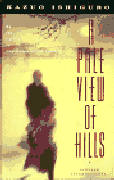|
||
|
|
Kazuo Ishiguro was born in Nagasaki, Japan, in 1954 and came to Britain at the age of five. He is the author of four novels: A Pale View of Hills (1982) An Artist of the Floating World (1986) The Remains of the Day (1989, winner of the Booker Prize) The Unconsoled (1995) A Pale View of Hills (1982)  A Pale View of Hills is not only a story about Etsuko, a Japanese woman now
living in England and divulging in memories of the hills of her hometown
Nagasaki, but is is also a story about clashes between the older and the
younger generation and about clashes between American values and
Japanese traditions as they competed after the Second World War.
A Pale View of Hills is not only a story about Etsuko, a Japanese woman now
living in England and divulging in memories of the hills of her hometown
Nagasaki, but is is also a story about clashes between the older and the
younger generation and about clashes between American values and
Japanese traditions as they competed after the Second World War.
The older generation represented by Ogata-San, Father of Etsuko's husband,
regrets the loss of discipline, loyalty and a sense of duty which used to hold
Japan together. Today obligation is non-existent and it is selfishness which
rules young people. Ogata-San even accuses Shigeo Matsuda of
discriminating him publicly in an educational magazine because Shigeo
names Ogata-San as an example of outdated values. Ogata thinks that Shigeo has been
brainwashed by the Americans.
|
| © 1997-2026 englischlehrer.de × Alle Rechte vorbehalten. × Ausgewiesene Marken gehören ihren jeweiligen Eigentümern. englischlehrer.de übernimmt keine Haftung für den Inhalt verlinkter externer Internetseiten. 4.586 (+0)pi × search powered by uCHOOSE |
|
